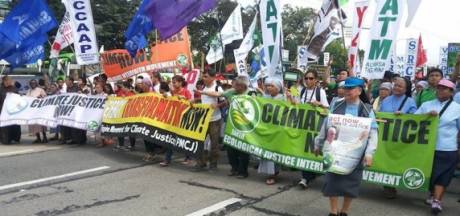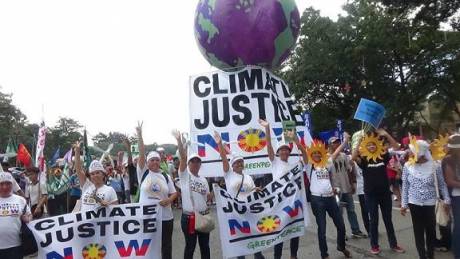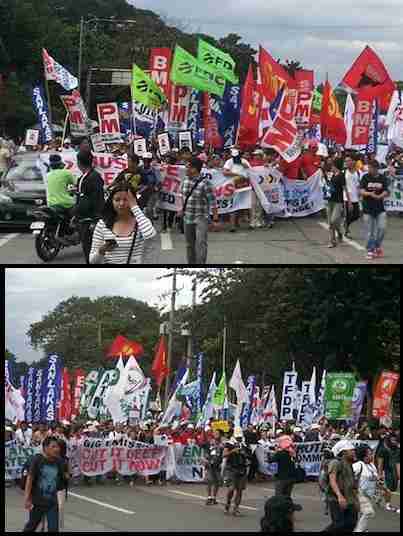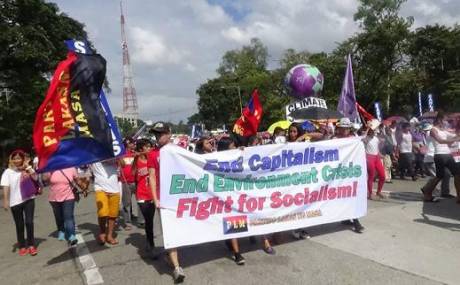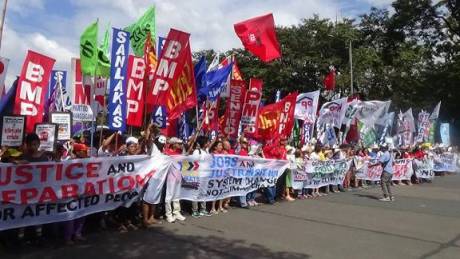Philippines: Climate Focus - Time to act is now on energy transformation
 international |
environment |
news report
international |
environment |
news report  Thursday December 10, 2015 04:59
Thursday December 10, 2015 04:59 by Gerry Arances (PMCJ)
by Gerry Arances (PMCJ)
What could possibly be so urgent and life-threatening to drive leaders of people from a small and barely reachable island off the coast of Mindoro to leave their homes and travel 285 kilometers by land and sea over the period of five days just to reach Metro Manila? On November 27, a day before the biggest climate justice march in the country, they have reach the Presidential Palace.
If Semirara sounds like a familiar name to you then chances are you may have heard about the island on the news and are familiar with its single greatest threat: coal. 97% of the country’s locally-produced coal is mined by a single corporation alone. The Semirara Mining and Power Corporation has been operating since the 1970s and aside from taking the lives of coal miners and causing numerous human rights violations, coal extraction has caused irreparable damage to the health, environment, and livelihood of all who reside in the island. Until decisive and earnest actions are duly taken, who knows how long they will continue this unregulated exploitation of life, environment, and livelihood?
And so it comes as no surprise that the people of Semirara have finally decided to personally elevate their fight to the National Government. They were joined by several communities from Mindoro, Batangas, Quezon, Laguna, Bataan, and Zambales who share the same plight and call, the People and Environment Against Coal-based Energy or PEACE Caravan aims to generate wider public support for the clean energy movement and compel the Aquino Administration to a dialogue in order to discuss clear solutions to this pressing matter. As the Administration that has approved the greatest number of coal projects in recent history, 59 new coal plants and 42 new coal mining permits, President Aquino needed to hear the firsthand account of what these dirty energy projects are doing to the people.
The entire life cycle of coal generates massive externalities that are forcibly being shouldered by our poorest and most defenseless communities. Without regard to their safety and well-being, corporations and the policies that favor them must be done away with if we are to avoid further damage to our country in the form of stronger and more frequent storms and heat waves among others.
A global call for a moratorium on all coal mines is already being propagated by Kiribati President Anote Tong. As the leader of one of the most vulnerable countries to rising sea levels, Tong does not take the matter of climate change lightly. The possibility of Kiribati being completely erased off the map is no longer a matter that he can put off in the future to address.
The similar threats and dangers posed to the many island nations in the Pacific due to excessive greenhouse gas emissions are also similarly looming our country. In fact, we have already experienced some of them and have not yet reached a point where we can say that we have truly recovered. Preventing further damage by mitigating climate change is a necessity if we are to ensure our survival and that of our children and grandchildren. This isn’t just for us, it’s for them too.
The all-too familiar narrative of preserving fossil fuel dependence in order to achieve economic development and progress is no longer working for us. It has not translated to less poverty and inequality and it never will. Coal has been and will continue to be harmful and detrimental to our survival as a country and as an entire race.
It is no coincidence that the communities leading the caravan to the Presidential Palace are demanding for a dialogue with the President days before he flies to Paris for the annual Conference of Parties (COP21) of the United Nations Framework Convention on Climate Change (UNFCCC). The Philippines has pledged to a 70% reduction in emissions from business-as-usual levels by the year 2030 pending international financial support. While this is commendable and sets an ambitious precedent as a starting point, it will fall short if the government does not put forward an unconditional part of its pledge. These intended contributions must be backed with concrete policies that will truly enable our country to shift to a low-carbon economy. We cannot afford not to.
From our perspectives, the 70% reduction can only be made possible by three major components. One, to rescind all 59 coal plant project permits, and declare a moratorium on new coal plant projects. This initiative alone could reduce 60Mtonnes of CO2 every year from 2020 to 2030. Second, to put into reality the tripling of the country’s renewable energy target which should be at 15GW by 2030, along with the push for demand side management efforts or the 10% energy efficiency initiative across energy demand sectors by 2030. These two government initiatives could already reduce our emissions at around 11% by 2020 and 25% in 2030 compared to the business as usual trajectory. Three, the country needs a phase-out plan on all coal project facilities and an ambitious push for 100% renewable in the country. This ambitious target is not far off, as the country once enjoyed more than 95% of renewable energy before the 90s. With more than 200,000MW renewable energy potential according to the government, the dream for an affordable and accessible 100% renewable energy system is practically reachable.
These measures will not only put the Philippines in a moral high ground to put forward more ambitious actions in the global arena necessary to keep the global temperature increase at below 1.5 degrees, it will also be beneficial to our communities, environment, and our economy. Global and local market prices of renewable have been radically reduced since its entry into world market, and current market trends indicate that it will continue to go down due to the growing global demand. Once these new coal plants get constructed and go on line, we are locked into not just an environmentally destructive, health hazard, climate buster type of energy source, but in the long run, an economically costly one.
There is no better time to act but now. The world needs the Philippines to act on the side of the growing global effort to shift away from fossil fuels and address in concrete terms the impending climate crisis.
The time to act was yesterday. The time for fundamental and meaningful changes is now.
Gerry Arances is the National Coordinator of the Philippine Movement for Climate Justice (PMCJ), and also the National Convenor of Power for People, a national broad campaign network resisting coal expansion and pushing for renewable energy transformation in the country.
http://climatejustice.ph/
________________________________________________________________________
Labor groups push for ‘just transition’ in March for Climate Justice
By Nagkaisa
Echoing the view of global trade unions that a shift to lower carbon economy is not just necessary but inevitable to address the worsening climate crisis, the coalition of labor groups Nagkaisa marched with multisectoral groups in the March for Climate Justice held in Quezon City this morning.
The group denounces corporate greed for spawning both a humanitarian and environmental crisis as manifested in the intensification of exploitative working conditions and the acceleration of climate change.
“When corporations rule under the framework of unlimited greed, workers endure the worst kind of exploitation. And when climate crisis worsened as tons of carbon are emitted into the atmosphere by oil and energy companies, mining and other hard industries, everyone suffers the brunt most particularly the poor people living in most vulnerable countries like the Philippines,” said Nagkaisa in a statement.
The group pointed out that while the country is less in carbon emission, her position of vulnerability can generate a powerful voice for demanding climate justice during negotiations.
“Unfortunately our government tailgated weakly behind the US position of simply having Intended Nationally Determined Contributions (INDC) process instead of playing hardball in pressing a return to binding cuts based on science and common but differential responsibility and which will limit temperature rise to 1.5 degrees Celsius,” lamented Nagkaisa.
The group said that even with INDC process and actual submissions, the UNEP still anticipates a 4-6 degrees Celsius, rendering the COP ineffective.
Workers were also apprehensive of the fact that while governments are active in climate negotiations, the next one in Paris next week, most of them didn’t have a clear framework on how to fine-tune this transition to lower carbon economy in a manner acceptable to the people.
Nagkaisa is pushing the framework for a ‘just transition’ which promotes social justice and employment, requires active government intervention, and demands proportionate responsibility from all stakeholders, including business.
“The Philippines, for instance, has not explicitly declared a timeline to when fossil-fuelled power plants are finally phased out so that the transition is clearly plotted in favour of renewable energy and the creation of climate jobs,” the group said.
The coalition believes further that thousands of climate jobs can be created in the country in the shift to renewable energy, disaster response and building climate resilient communities that includes resettlement in climate-proof buildings and housing projects, as well as the greening of mass transport system.
“Funding is main requirement for this shift. In climate negotiations, the rich industrial nations must be made responsible in funding the transition of most vulnerable nations,” the group added.
Nagkaisa said transition policies should not, in any way, transgress into the framework of decent work since regular job and social security help build the resiliency of many people against the wrath of Mother Nature.
The NAGKAISA (United), an issue-based umbrella labor rights group, which will consistently and passionately work toward restoring the right to full protection and the chance to live a decent and dignified life for all Filipino working men and women -- whether formal or informal, private or public, here or abroad.
Nagkaisa! include the Alliance of Filipino Workers (AFW), affiliates of the Associated Labor Unions-Trade Union Congress of the Philippines (ALU-TUCP), members of SENTRO, Bukluran ng Manggagawang Pilipino (BMP), Confederation of Independent Unions in the Public Sector (CIU), Federation of Free Workers (FFW), Manggagawa para sa Kalayaan ng Bayan (MAKABAYAN), National Federation of Labor Unions (NAFLU), National Mines and Allied Workers’ Union (NAMAWU), National Confederation of Labor (NCL), Philippine Airlines Employees Association (PALEA), Philippine Government Employees Association (PGEA), Partido ng Manggagawa (PM), Public Services Labor Independent Confederation (PSLINK), Philippine Transport and General Workers Organization (PTGWO), Technical Education and Skills Development Authority-Association of Concerned Employees (TESDA-ACE).
NAGKAISA is the broadest coalition of labor groups in the Philippines to date. It is composed of labor centers, federations and national unions.
https://www.facebook.com/Nagkaisa-421413561266645/
________________________________________________________________________
March for Climate Justice held in Quezon City
https://www.youtube.com/watch?v=mY7LhsSUBV8
